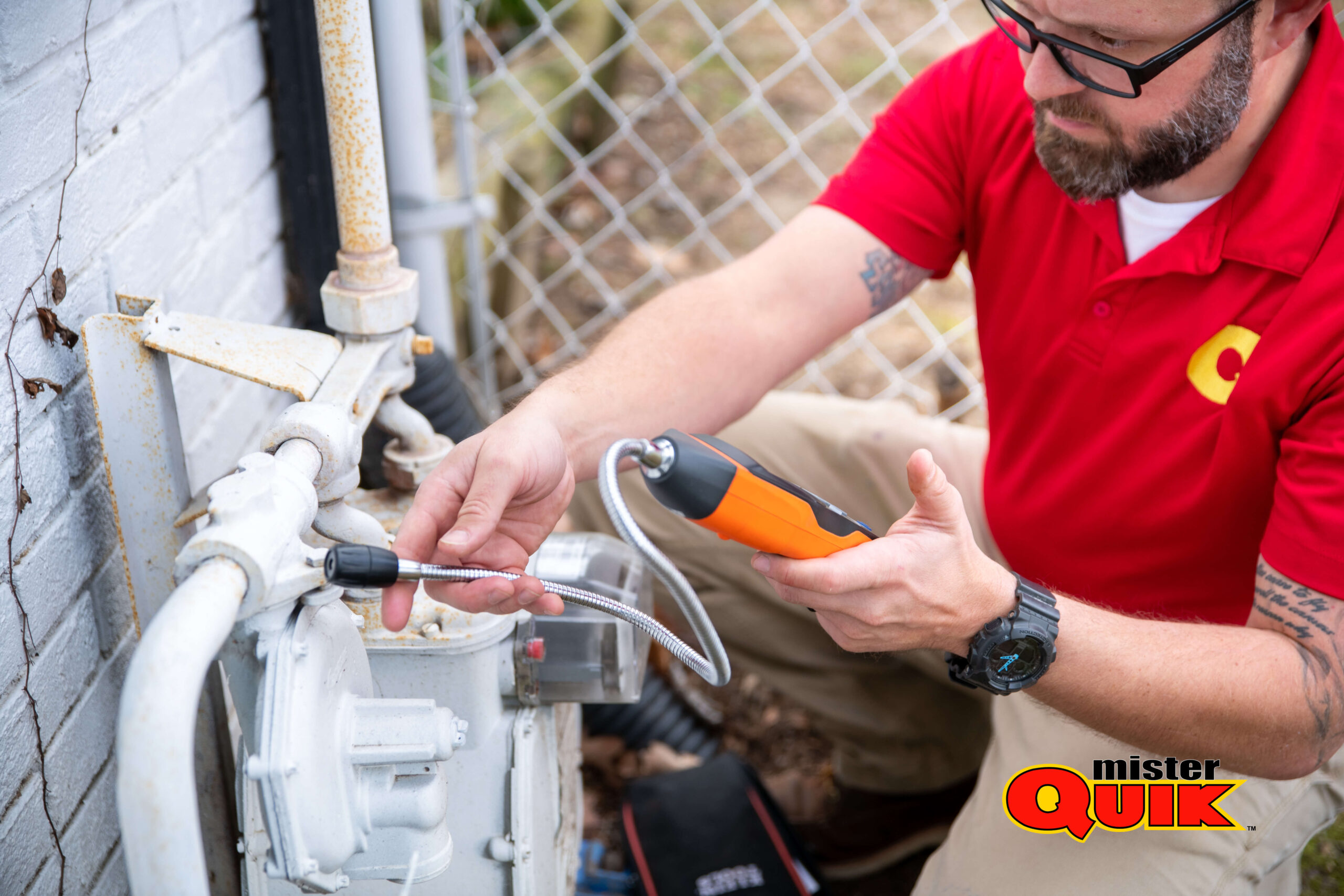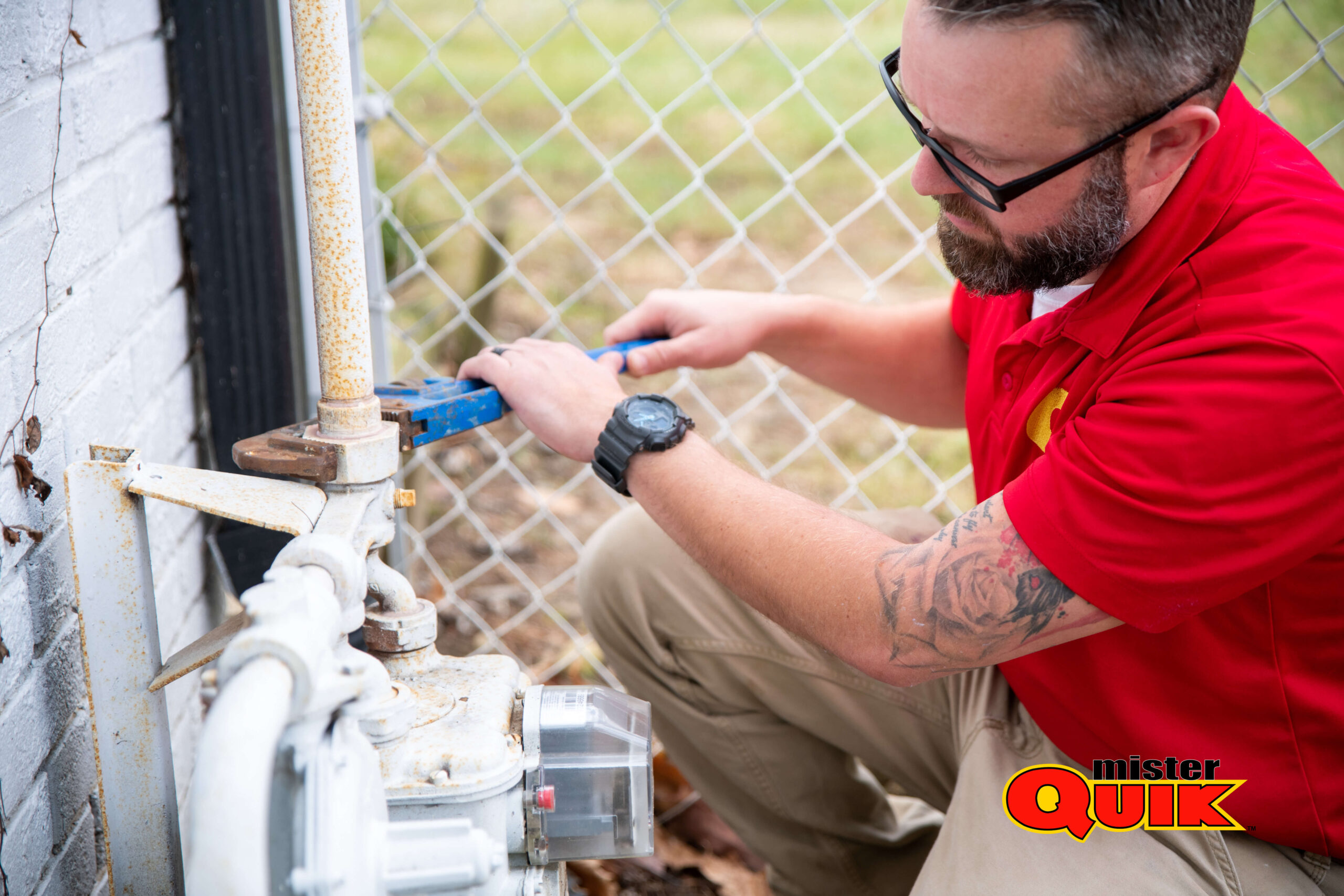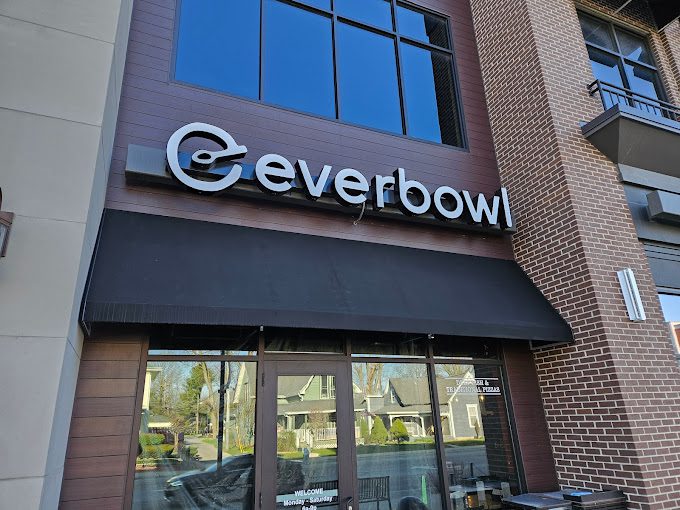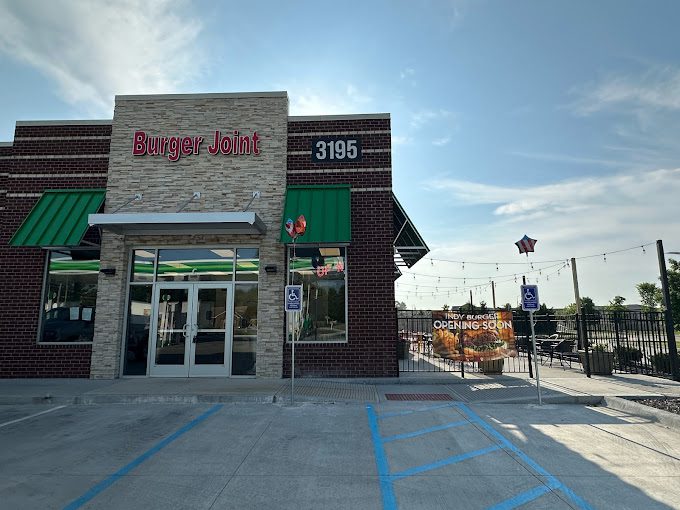Brownsburg Gas Line Repair

Gas Line Repair Near Me
When it comes to addressing gas line issues, locating prompt and reliable repair services near Brownsburg is essential for ensuring the safety and functionality of your home’s gas system. Here’s how you can effectively find gas line repair services near you:
- Local Service Providers: Start your search by looking for local home service companies that specialize in gas line repairs. Opting for local providers like Mister Quik Home Services ensures quick response times and familiarity with the area’s regulations and infrastructure.
- Online Search: Utilize search engines to find gas line repair services near Brownsburg. Use relevant keywords such as “gas line repair Brownsburg” or “gas line repair near me” to generate a list of nearby service providers. Explore their websites to learn more about their services, experience, and customer reviews.
- Customer Reviews: Pay attention to customer feedback and reviews while researching gas line repair companies. Positive reviews indicate reliable service, expertise, and customer satisfaction. Platforms like Google and Yelp can provide valuable insights into the reputation and reliability of different service providers.
- Ask for Recommendations: Seek recommendations from friends, family, or neighbors who have recently had gas line repairs or maintenance done in Brownsburg. Personal referrals often lead to trustworthy and dependable service providers.
- Check Credentials: Verify the credentials and qualifications of gas line repair companies before hiring them. Ensure they are licensed, bonded, and insured to perform gas line repairs in Brownsburg. Additionally, inquire about their technicians’ training and certifications to guarantee expertise and professionalism.
- Emergency Services: Prioritize gas line repair companies that offer emergency services in Brownsburg. Gas leaks and related issues demand immediate attention to prevent safety hazards and property damage. Choose a company like Mister Quik Home Services that offers 24/7 emergency repair services for peace of mind.
- Customer Service: Evaluate the customer service quality of gas line repair companies during your interactions. Choose a company that is responsive, communicative, and prioritizes customer satisfaction. Clear communication and transparency throughout the repair process are crucial for a positive experience.
- Guarantees and Warranties: Inquire about the warranties and guarantees offered by gas line repair companies for their services. Reputable companies stand behind their workmanship and provide warranties to ensure customer satisfaction and peace of mind.
- Safety Measures: Prioritize gas line repair companies that prioritize safety measures and adhere to industry standards and regulations. Ensure they conduct thorough inspections, follow proper protocols, and prioritize safety during repairs to protect your home and family.
By following these steps and considering these factors, you can effectively find reliable gas line repair services near Brownsburg. Trusting experienced and reputable companies like Mister Quik Home Services ensures timely and efficient solutions for all your gas line repair needs.
Gas Leak Signs
Gas leaks are a serious safety hazard that can pose significant risks to your health and property. Being able to recognize the signs of a gas leak is crucial for prompt detection and intervention. Here are some key indicators to watch for:
One of the most common signs of a gas leak is the presence of a foul, sulfur-like odor resembling rotten eggs. This distinct smell is added to natural gas as a safety measure to help detect leaks. If you notice this odor in your home, it's important to take immediate action.
Gas leaks can sometimes produce hissing or whistling sounds near gas appliances, pipes, or connections. If you hear unusual noises coming from your gas lines or appliances, it could indicate a leak. Do not ignore these sounds; they signal a potential danger that requires immediate attention.
Inspect your gas appliances, pipes, and connections for any visible signs of damage, corrosion, or deterioration. Look for rust, cracks, or discolored areas, especially around gas valves, fittings, or flexible connectors. Physical damage to gas lines can lead to leaks and should be addressed promptly.
A gas leak can affect indoor plants by depriving them of oxygen and releasing toxic chemicals into the air. If you notice sudden wilting, yellowing, or dying plants in your home, it could be a sign of a gas leak. Pay attention to any changes in the health of your indoor plants as an early warning sign.
Exposure to natural gas can cause a range of physical symptoms in humans and pets. These may include headaches, dizziness, nausea, fatigue, difficulty breathing, and eye or throat irritation. If you or your family members experience any of these symptoms without explanation, evacuate the area immediately and seek medical attention.
A sudden and unexplained increase in your gas bill could indicate a gas leak in your home. Leaking gas can cause your appliances to work harder and consume more fuel, leading to higher energy costs. Monitor your gas usage and bills closely, and investigate any significant spikes or fluctuations.
Gas appliances equipped with pilot lights, such as water heaters and furnaces, may experience frequent pilot light extinguishments if there is a gas leak present. If you notice that your pilot lights constantly go out or have difficulty staying lit, it could be a warning sign of a gas leak.
If you or your family members consistently feel unwell or experience symptoms of carbon monoxide poisoning while at home, it could be due to a gas leak. Carbon monoxide is a byproduct of incomplete combustion of natural gas and can be emitted during a gas leak. Install carbon monoxide detectors in your home to alert you to this invisible threat.
If you notice any of these signs of a gas leak in your home, it's crucial to take immediate action to ensure your safety and well-being. Evacuate the area, avoid using any electrical devices or open flames, and contact a qualified professional like Mister Quik Home Services in Brownsburg to assess and repair the gas leak promptly. Ignoring the signs of a gas leak can lead to serious health risks and potential property damage.
The life expectancy of a gas line can vary depending on factors such as the material used, installation quality, and environmental conditions. Generally, gas lines made of materials like steel or copper can have a lifespan of several decades, ranging from 20 to over 50 years. However, factors like corrosion, soil conditions, and external damage can impact the longevity of gas lines. Regular inspections, proper maintenance, and adherence to safety standards are crucial for ensuring the safe and reliable operation of gas lines over their lifespan. It’s advisable to consult with a qualified professional to assess specific situations and determine the condition and potential lifespan of a gas line.
While plumbers are skilled in working with water systems, they may not be equipped or licensed to handle gas-related issues. Gas leaks pose significant safety risks, and it’s crucial to involve a qualified professional, such as a licensed gas fitter or plumber, for gas leak detection, repair, and related services. These specialists have the necessary expertise and equipment to address gas-related issues safely and effectively, ensuring the well-being of both individuals and properties. If you suspect a gas leak, it’s recommended to contact the relevant authorities or a licensed professional immediately.
The frequency of replacing stove gas lines depends on various factors such as the material of the gas lines, their condition, and local regulations. Generally, gas lines are designed to be durable, and routine maintenance can extend their lifespan. However, if there are signs of wear, corrosion, or damage, it is crucial to replace them promptly to ensure safety. It is advisable to have a professional inspect gas lines periodically and follow manufacturer recommendations or local codes for replacement intervals. Regular maintenance and immediate attention to any issues contribute to the safe and efficient functioning of stove gas lines.
A small gas leak should be taken very seriously, as even minor gas leaks can pose significant risks to health and safety. Natural gas is highly flammable, and exposure to it in enclosed spaces can lead to respiratory issues, headaches, dizziness, and, in extreme cases, even asphyxiation. Additionally, gas leaks increase the risk of fire or explosions. If you suspect a gas leak, it is crucial to evacuate the area immediately, avoid using any electrical devices or open flames, and contact the gas company or emergency services to assess and address the situation promptly. Ignoring or mishandling gas leaks can have severe consequences, making swift and appropriate action essential.
Typically, homeowners insurance covers damage resulting from sudden and accidental events, including certain types of gas leaks. However, coverage may vary based on the specific policy and the cause of the gas leak. If the leak is due to wear and tear, lack of maintenance, or gradual deterioration, it might not be covered. It’s crucial to review the terms of your homeowners insurance policy, and in the event of a gas leak, promptly contact your insurance provider to understand the extent of coverage and initiate the claims process.
Leaking water pipe repair
Leaking Water Pipe Repair in the City of Carmel
If you’re a homeowner or resident in the beautiful City of Carmel and are dealing with a leaking water pipe, you understand the urgency and potential risks associated with such issues. Addressing a leaking water pipe promptly is crucial to prevent extensive damage to your property. In this guide, we’ll provide you with all the necessary information, including costs, risks, best options, and precautionary measures to ensure a smooth and effective resolution to your leaking water pipe problem.


Understanding the Potential Costs and Risks:
- Leaking water pipes can lead to increased water bills and potential property damage.
- Repair costs may vary depending on the extent of the damage and the location of the leak.
- Delaying repairs may result in more significant expenses and long-term structural issues.
Our Best Options and Recommendations:
- Contact a licensed and experienced plumber to assess and repair the leaking pipe promptly.
- Consider trenchless repair methods for minimal disruption to your property.
- Explore the possibility of pipe replacement if the damage is extensive or if your plumbing system is outdated.
Precautionary and Safety Measures:
- Turn off the water supply to the affected area or the entire house to minimize water damage.
- Avoid attempting DIY repairs unless you have the necessary skills and knowledge.
- Keep a professional plumber’s contact information handy for emergency situations.
When faced with a leaking water pipe in Carmel, swift and informed action is key to preventing further damage. By understanding the costs, risks, and best options, you can make decisions that will protect your home and save you money in the long run. Remember to prioritize safety and reach out to a qualified plumber to handle the repair efficiently. Don’t let a leaking water pipe dampen your homeownership experience—take proactive steps to address the issue and safeguard your property.
Gas Pipeline For Homes
Gas pipelines for home use are crucial for ensuring a reliable and efficient supply of natural gas to power appliances such as stoves, water heaters, and furnaces. When considering the best gas pipelines for your home, several factors come into play, including safety, durability, and compatibility with your home’s infrastructure. Here are some top recommendations:



CSST is a popular choice for gas pipelines in residential settings due to its flexibility, ease of installation, and cost-effectiveness. CSST pipes are lightweight, making them easy to handle and install, while their corrugated design allows for greater flexibility and bendability compared to rigid pipes.



Traditional black iron pipes have long been used for gas pipelines in homes due to their strength and durability. These pipes are made from mild steel and coated with a layer of black oxide to prevent rust and corrosion. While black iron pipes are more rigid and less flexible than stainless steel or CSST pipes, they offer excellent durability and longevity when properly installed and maintained.



PE pipes are commonly used for underground gas pipelines due to their resistance to corrosion, abrasion, and chemical damage. These flexible plastic pipes are lightweight and easy to install using heat fusion or mechanical fittings. PE pipes are ideal for residential applications where underground installation is necessary, such as supplying natural gas to outdoor appliances or heating systems.



It's crucial to consult with qualified professionals, such as those at Mister Quik Home Services in Brownsburg, to determine the best gas pipeline solution for your home. They can assess your specific needs, evaluate your home's infrastructure, and recommend the most suitable piping materials and installation methods to ensure safe and reliable gas supply to your appliances.
When choosing a gas pipeline for your home, prioritize safety, durability, and compatibility with your home's infrastructure. By selecting the right pipeline material and installation method, you can ensure a reliable and efficient gas supply that meets your household's needs for years to come.
Gas Repiping
Gas repiping is a process of replacing old or damaged gas pipes in a home with new, safer, and more durable pipes. It’s a critical maintenance task that ensures the safety and reliability of your gas supply system. Here’s a breakdown of what gas repiping entails and how it works:
Assessment: The process typically begins with a thorough assessment of your existing gas piping system. A qualified technician from Mister Quik Home Services will inspect the condition of your pipes, looking for signs of corrosion, leaks, or other damage. They will also evaluate the layout and configuration of your gas lines to determine the scope of the repiping project.
Safety Concerns: Gas repiping is often necessary if your existing gas pipes are old, corroded, or damaged, posing safety risks such as gas leaks or carbon monoxide exposure. Repiping ensures that your home’s gas supply system meets current safety standards and regulations, protecting your family and property from potential hazards.
Material Selection: Once the assessment is complete, the next step is to select the appropriate materials for the new gas pipes. The most common material used for gas repiping include, CSST (corrugated stainless steel tubing).. The choice of material depends on factors such as budget, local building codes, and compatibility with your home’s existing infrastructure.
Installation Process: Gas repiping involves removing the old gas pipes and installing new ones in their place. The installation process may vary depending on the layout of your home and the chosen piping material. For example, if using CSST the installation may involve bending and routing the flexible tubing through walls, floors, and ceilings to connect gas appliances.
Testing and Inspection: After the new gas pipes are installed, they undergo rigorous testing to ensure they are functioning correctly and safely. This may involve pressure testing the system to check for leaks or using specialized equipment to detect any gas leaks. Additionally, local building inspectors may conduct inspections to verify that the repiping work complies with relevant building codes and regulations.
Completion and Cleanup: Once the repiping work is complete and passes all necessary inspections, the technicians will finalize the installation by securing any exposed pipes and restoring any areas that were disturbed during the process. They will also clean up the work area, removing any debris or materials leftover from the repiping work.
Gas repiping is a complex and specialized task that requires the expertise of trained professionals like those at Mister Quik Home Services in Brownsburg. By investing in gas repiping, you can ensure the safety, reliability, and efficiency of your home’s gas supply system for years to come. If you have concerns about the condition of your existing gas pipes or are considering repiping for your home, contact Mister Quik Home Services for a comprehensive assessment and expert guidance.
Gas Line Replacement Cost
Gas line replacement is a significant investment in your home’s safety and functionality. The cost of replacing gas lines can vary depending on several factors, including the extent of the replacement, the type of piping material used, and local labor rates. Here’s a breakdown of the expenses and considerations associated with gas line replacement:
Before determining the cost of gas line replacement, a thorough assessment and inspection of your existing gas lines are necessary. Mister Quik Home Services in Brownsburg will evaluate the condition of your current gas piping system, identifying any issues such as leaks, corrosion, or damage that necessitate replacement.
Labor costs typically account for a significant portion of the overall expense of gas line replacement. The complexity of the replacement, accessibility of the gas lines, and local labor rates can all impact labor costs. Additionally, if specialized equipment or expertise is required for the replacement, it may incur additional expenses.
The cost of materials for gas line replacement varies depending on the type of piping material chosen. Each material has its own cost per linear foot, with factors such as durability, flexibility, and compatibility influencing the selection.
In many jurisdictions, permits are required for gas line replacement projects to ensure compliance with building codes and safety regulations. Permit fees vary depending on the location and scope of the project. Mister Quik Home Services will obtain any necessary permits on your behalf, but the associated fees will be included in the overall cost of the replacement.
If the gas lines are located underground or within walls, floors, or ceilings, excavation and restoration may be necessary during the replacement process. Excavation costs can add to the overall expense, particularly if extensive digging or landscaping is required. Restoration costs include repairing any areas that were disturbed during the replacement, such as patching walls or reseeding lawns.
Depending on the condition of your existing gas lines and the scope of the replacement project, additional services may be required. These can include gas line rerouting, upgrading gas meters or regulators, or installing new gas appliances. Each additional service will incur its own cost, contributing to the total expense of the replacement.
It's advisable to budget for unforeseen expenses or unexpected challenges that may arise during the gas line replacement process. Having contingency funds set aside can help cover any unexpected costs without derailing the project or compromising safety.
While cost is an important factor, it's essential to prioritize quality and expertise when choosing a contractor for gas line replacement. Hiring a reputable and experienced company like Mister Quik Home Services ensures that the replacement is done correctly and safely, minimizing the risk of future issues or complications.
Although gas line replacement incurs upfront costs, it can result in long-term savings by improving the efficiency and reliability of your gas supply system. Newer, more durable gas lines are less prone to leaks, corrosion, and other problems, reducing the need for frequent repairs and maintenance.
Ultimately, the cost of gas line replacement is an investment in the safety and peace of mind of your household. By ensuring that your gas lines are in good condition and up to code, you can enjoy the comfort and convenience of your gas appliances without worrying about potential hazards or safety risks.
When considering gas line replacement, it’s essential to factor in all associated expenses and considerations to make an informed decision. By working with a trusted and experienced contractor like Mister Quik Home Services, you can ensure that your gas line replacement project is completed efficiently, safely, and within budget. Contact Mister Quik Home Services for a comprehensive assessment and estimate for your gas line replacement needs in Brownsburg.
Troubleshoot Checklist:
- Strange Odor: Check for a foul, sulfur-like odor resembling rotten eggs, which indicates a gas leak.
- Hissing Sounds: Listen for hissing or whistling sounds near gas appliances, pipes, or connections, which may signal a leak.
- Visible Damage: Inspect gas appliances, pipes, and connections for rust, cracks, or discolored areas, especially around valves and fittings.
- Dead Plants: Look for sudden wilting or yellowing of indoor plants, which could indicate a gas leak affecting air quality.
- Physical Symptoms: Pay attention to physical symptoms like headaches, dizziness, nausea, or eye/throat irritation, which may indicate gas exposure.
- High Gas Bills: Monitor gas bills for unexplained spikes, as increased consumption could signal a leak.
- Pilot Lights: Note if pilot lights frequently extinguish, as it could indicate a gas leak affecting appliance operation.
- Feeling Unwell: If experiencing symptoms of gas exposure or carbon monoxide poisoning, evacuate the area immediately and seek medical attention.
- Qualified Technician: Contact a licensed gas fitter or plumbing technician, such as Mister Quik Home Services, for prompt detection and repair of gas leaks.
- Insurance Coverage: Review homeowners insurance policy to determine coverage for gas leaks and related damages, and initiate claims process if applicable.










